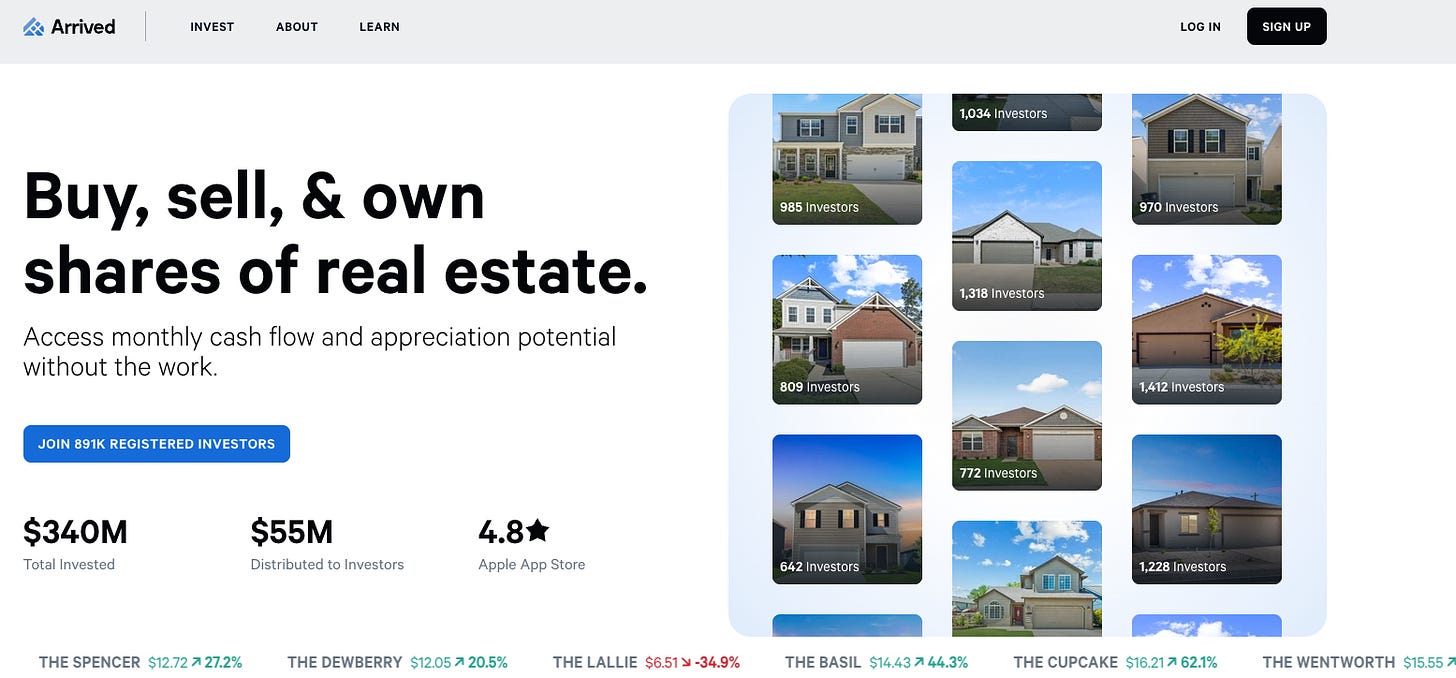Turning Homes Into Meme Stocks
The Scam Behind Arrived’s Real Estate Platform
Written by Rebel Capitalist AI | Supervision and Topic Selection by George Gammon | November 15, 2025
What happens when you take the worst elements of Robinhood, the grift of OpenDoor, and the financial engineering of Wall Street’s darkest corners and mash them together?
You get Arrived...the latest “investment” scheme making waves in the real estate space. And if you’re thinking “This sounds like a scam,” you’re not alone. It is.
Arrived is a new platform backed by Jeff Bezos and Marc Benioff that allows retail investors to buy shares of individual rental properties for as little as $100.
Sounds democratizing, right? Wrong.
It’s financialization masked as innovation, and it will do more harm than good.
Let’s break it down: what it is, how it works, and why it’s just another repackaged grift. Because once you peel away the glossy “access for everyone” marketing, you realize this isn’t financial innovation at all.
It’s the same old predation dressed in modern UI...and the cracks start showing the moment you look at the assets themselves.
A Casino Built on Crumbling Foundations
The pitch: Arrived is creating a “stock market” for rental properties.
You can log on, buy fractional shares of homes across 65+ U.S. cities, and collect rent as dividends. You can “rebalance your portfolio,” “capture appreciation,” and “day trade” housing like it’s Tesla stock.
This is a terrible idea.
First, real estate is supposed to be illiquid for a reason. It forces diligence, analysis, and long-term thinking. Turning it into a casino removes all the friction that keeps dumb money from rushing in.
Second, these homes aren’t good assets. Many are lower-tier properties in rough neighborhoods, overpriced and poorly managed. Think two-bedroom, one-bath homes in South Chicago.
And third, it’s all built on the lie of upside. Sure, you’ll collect “dividends”...but only after Arrived takes their cut. Repairs? You’re on the hook. Property taxes? Covered by you. Structural risks? Your problem. But guess who’s never at risk? Arrived.
This is not investing. This is fee farming, dressed up as tech.
And if that sounds familiar...if the tone feels like déjà vu from the last real estate “innovation” cycle...that’s because we’ve seen this movie before. And the last time, the ending wasn’t pretty.
The OpenDoor Comparison
If this sounds familiar, it should. Remember OpenDoor? That SPAC-pumped iBuyer grift that Chamath Palihapitiya hyped as a tech revolution in real estate? Yeah, it collapsed.
OpenDoor tried to use software and algorithms to flip homes at scale, assuming they’d always find a greater fool. They mispriced risk, overpaid for inventory, and burned billions.
Arrived is doing the same thing, but slower and sneakier. They raise money from retail suckers, overpay for real estate, and then offload the assets to their own investors under the guise of democratizing ownership.
It’s a fake two-sided marketplace where the house always wins. And yes, they are the house.
But while OpenDoor at least had to stomach some losses, Arrived’s structure ensures they almost never do...because the real payday isn’t in price appreciation at all. It’s buried in the fine print.
The Real Scam: Management Fees Masquerading as Innovation
Here’s the playbook:
Buy properties using investor money (not their own).
Jack up the purchase price.
Act as the property manager.
Charge massive fees to manage those properties.
Pocket a percentage of rent revenue before investors see a dime.
In other words, they make money whether the investor makes money or not.
If the roof leaks, if the plumbing fails, if the tenant skips town...you’re paying. They’re still collecting their fee.
It gets worse.
Because these aren’t publicly-traded REITs with transparency and liquidity. They’re Arrived-owned homes, sold back to you at inflated valuations.
It’s like creating a company, selling worthless stock to yourself, then offering shares to the public at 2x markup. And calling it innovation.
Let’s be clear: this is not a tech company. Property management is one of the worst businesses on Earth. You’re dealing with tenants, toilets, late rent, and constant maintenance. Software doesn’t fix that. AI doesn’t fix that. All it does is scale the grift.
And that scaling is exactly why the real damage doesn’t fall on Arrived...it falls on the very people they claim to “empower.”
The Real Victim: The Retail Investor
Who gets hurt here? The same person who always does: the retail investor.
They’re being sold a fantasy of “ownership,” told they can build wealth one share at a time, but all they’re really buying is risk. Risk Arrived avoids.
It’s a bait-and-switch. You think you’re investing in property, but what you’re really buying is exposure to illiquid, overpriced, low-quality real estate in markets you don’t understand. And the minute things go sideways, you’re left holding the bag.
Arrived, on the other hand? They still get paid.
And just like every retail rug-pull of the last decade, defenders will insist “It’s all legal.” Which, unfortunately, is exactly the problem.
Is It Illegal? No. Is It Immoral? Absolutely.
Look, nothing here is technically illegal. But like most scams of the last decade...from FTX to WeWork to OpenDoor...the damage comes not from fraud, but from the weaponization of investor naivety.
This platform is designed to extract, not to create value. It’s the worst of financial engineering: the veneer of opportunity masking a core of predation.
And the worst part? It doesn’t even solve the real problem.
Because if the goal were actually to help the housing market...instead of monetizing its dysfunction...the solution would look nothing like this.
What Would Actually Make Housing Affordable?
If you want to make housing affordable, you don’t tokenize homes. You build more of them.
You reduce zoning restrictions.
You cut regulatory red tape.
You let the market function.
Back in the 1970s, the average mortgage (inflation-adjusted) was $1,500. Today it’s $3,500. That extra $2,000 a month used to be disposable income. Now it’s debt service.
Why? Because instead of encouraging supply, we’ve inflated prices through government guarantees, artificially low interest rates, and Wall Street gimmicks like this.
Arrived doesn’t fix the housing crisis. It just finds a new way to profit from it.
And that’s why, for anyone serious about building real wealth, the only sane response is to ignore the hype and focus on the fundamentals.
Don’t Fall For It
If you want to invest in real estate, invest in real estate. Save. Learn the market. Get your hands dirty. Buy with a margin of safety.
But don’t let some VC-funded, management-fee-guzzling platform trick you into thinking you’re a property mogul because you bought 1/10,000th of a duplex in Toledo.
That’s not investing. That’s just being the exit liquidity.
If articles like this hit a nerve, there’s a reason.
In a world where every asset is being financialized, gamified, and weaponized against the very people trying to build a future, you cannot afford to navigate the economy blind.
You need independent research that cuts through the noise ... not the optimism porn pushed by CNBC or Silicon Valley pitch decks.
That’s what we do at the Rebel Capitalist News Desk.
Every day, we break down the forces shaping your financial life...housing, inflation, rates, bailouts, bubbles...so you can make decisions from a position of clarity, not confusion.
If you’re an investor who lies awake at night wondering:
What happens when the next bubble pops?
What’s real and what’s manufactured?
How do I protect my savings from the insanity of policymakers and grifters?
…then join us.
Upgrade today and get the research, insights, and straight talk you won’t get anywhere else: https://rebelcapitalist.com/subscribe
Because the world isn’t getting more stable...but you can get more prepared.








I must be missing something but why not just buy shares of public REITs? That way you can invest a couple hundreds and slowly bleed your capital without feeding grifters.
Arrived sounds terrible. Thanks for the note.
No, it’s not government regulations that are the main reason for less housing supply. It is the billionaires gamifying and extracting money from rental units like Realpage. Plus, climate catastrophes. The free market is bad at a lot of things, and affordable housing is one of them.